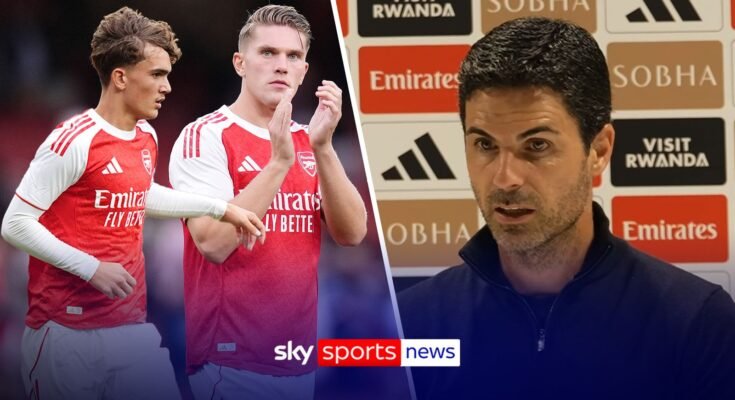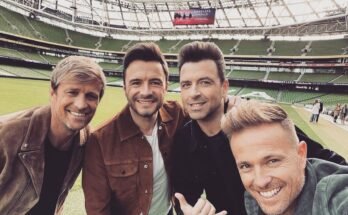Let’s start with Max Dowman, the 15-year-old midfield prodigy who’s rapidly drawing attention within the Arsenal academy setup. Dowman, still technically a schoolboy, made headlines when he appeared in Arsenal’s pre-season preparations. His composure, technical ability, and intelligence on the ball defied his age, sparking speculation that he could be fast-tracked through the ranks.
Arteta’s comments about Dowman, made during a recent media availability, offered rare insight into how highly the youngster is rated. “Max is a very special talent,” Arteta said. “He has an incredible understanding of the game for someone so young. It’s not just about ability—it’s about mentality. He’s got both.”
The manager also stressed the importance of managing expectations and protecting young players from overexposure. “We’re talking about a 15-year-old here. It’s our responsibility to nurture him properly. Hale End is doing an excellent job, and we want to keep providing him with the right environment to grow.”
Dowman’s emergence is a testament to the strength of Arsenal’s youth development program, which continues to produce talent capable of contributing to the first team. But his rapid rise also throws into sharp focus one of Arteta’s ongoing dilemmas—how to integrate academy players into a squad that is under immense pressure to compete for major honors now.
The Weight of Arsenal: Managing a Giant in the Modern Game
Beyond individual talents like Dowman, Arteta is also grappling with the broader challenge of managing Arsenal Football Club—a global institution with a rich history, demanding fanbase, and enormous commercial expectations.
Arsenal is not just a football team; it’s a brand, a business, and a symbol of tradition and ambition. From the boardroom at the Emirates to supporters’ clubs in Nigeria, India, and the U.S., the reach of the club means every decision is scrutinized, every result dissected.
Arteta, still one of the youngest managers in the Premier League, is walking a tightrope. On one hand, he’s been praised for instilling a tactical identity, improving player development, and re-establishing Arsenal in the upper echelons of the league. On the other hand, the expectations are relentless. Every trophy missed, every loss to a rival, every transfer misstep—all are amplified under the microscope that comes with leading a club of this size.
Squad Building and Balancing Youth with Experience
One of the major challenges for Arteta has been balancing the long-term project with the demand for short-term success. Integrating talents like Bukayo Saka, Emile Smith Rowe, and potentially Max Dowman, while also pursuing Premier League titles and Champions League campaigns, is no easy feat.
In recent seasons, Arsenal has invested heavily in young players with high ceilings—Declan Rice, Kai Havertz, and Jurrien Timber among them—but it’s clear that the club is also hungry for immediate results. That puts Arteta in a unique managerial pressure cooker.
“It’s a balancing act,” Arteta admitted recently. “We want to win now, but we also have a responsibility to build something that lasts. That’s the challenge—and it’s what makes this job so demanding.”
The External Noise and the Culture Shift
Another layer of complexity is the external noise—the punditry, the online fan culture, and the sheer volume of discourse surrounding every decision made at Arsenal. Social media means managers are no longer shielded from public opinion. Every starting XI, substitution, and press conference becomes a flashpoint for debate.
To Arteta’s credit, he has attempted to instill a new culture at the club, often referring to “non-negotiables” in terms of discipline, professionalism, and unity. The famous “trust the process” mantra has become part of the club’s modern identity, but it also opens the door to criticism when results don’t immediately follow.
That pressure is magnified by Arsenal’s size. The club has an illustrious past, with legends like Arsène Wenger and Thierry Henry casting long shadows. Fans aren’t just hoping for success—they’re expecting it. And that’s a heavy burden for any manager to carry, let alone one still learning on the job.
Looking Ahead: A New Era with Youth at the Core?
As Arsenal looks to build for the future, the emergence of players like Max Dowman offers both promise and a reminder of the club’s deep footballing roots. If Arteta can continue to balance youth development with elite performance, he may yet achieve what so many before him have found elusive—sustainable success at one of football’s most demanding clubs.
The next few seasons will be critical. With a new generation knocking at the door and silverware within reach, Arteta’s ability to navigate the pressures of managing Arsenal will define his legacy.
For now, Max Dowman remains a symbol of potential—a glimmer of what could be a golden future. And Mikel Arteta, for all the pressure he faces, seems quietly determined to shape that future, one decision at a time.
Final Thoughts
Today’s show reminds us of the delicate balance between nurturing promise and managing expectation. Arsenal is a club of immense scale—something that brings both privilege and pressure. Mikel Arteta is steering that ship with clarity, even as the waters grow choppy. And Max Dowman? He may just be the next beacon of hope lighting the way ahead.
Stay tuned. The Arsenal story is far from finished.



